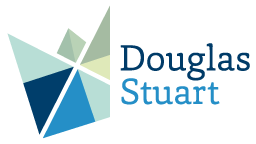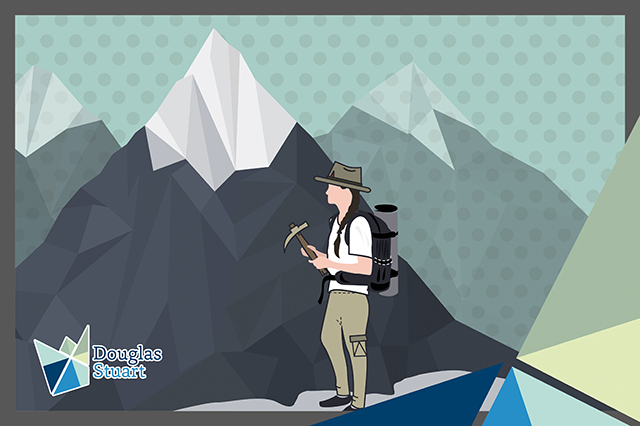Emily Ness Feasey, a Geoscientist working for Shell in the US, talks to us about how a passion for geology and the outdoors led to a career in Basin Modelling.
Finding a fulfilling career isn’t always about having a clear plan, sometimes it’s as much to do with serendipity and discovering a passion. For Emily Feasey, her interest in geology was piqued when some girls in her dorm at university brought back some rocks to study. She says,
‘I had a list of 15 classes I might want to take – I needed a lab science and thought geology looked neat based on other young women in my dorm who were talking about it – they had brought home rocks to learn about. I had a really great professor who drew wonderful pictures, explaining all the concepts and we went on some field trips to the surrounding geology laboratory of the Rocky Mountains. I loved the outdoors, hiking, camping, etc and knew Earth Science was a great program for me.’
A year’s stint as a mud logger on oil and gas wells in the Rocky Mountains following her undergraduate degree, led to her taking a Masters degree in Geological sciences. Despite her lack of experience in energy and soft rocks, Exxon Mobil recognised her potential, and following an internship, offered her a full time position. Here she stayed for three years, before moving to Anadarko Petroleum, and most recently, as a specialist in Basin Modelling for the BG group, now part of Shell.
We asked Emily about what it’s like to be a woman in the industry.
Given the shortage of girls studying STEM subjects at school and university, it’s important they’re being encouraged by industry, schools, career advisers, peers and parents to do so. Was there anyone who really encouraged you, or on the flip side, perhaps didn’t?
Much of it was going in kind of blind and only realizing that this shortage of women in STEM exists in hindsight. I just didn’t even realize anything in STEM was a particularly viable career option when I was younger. If someone, like my current day self, had visited classrooms in middle school, it would have been on my radar.
Once I began majoring in geology, my dad was very encouraging as he had started with chemistry and loved astronomy. Perhaps it is simply anecdotal, but I feel like women often want to do something that helps people or is human-oriented. I think I wanted to “help” and that’s why gravitated to Earth Science, thinking someday I would teach. I still struggle with this from time to time, but feel maybe my way of helping people is to send a message- like the one these questions are for – maybe I could help other women find fulfilling careers that would make them savvy and proud and financially independent. I have four daughters (and one son) so I’m doing my best to make an impact in their world, about what being a successful woman means, and that it can be found with a career in STEM if that’s something that interests them. There is a big message for today’s children – that you should follow your passion. The older you get, the more passionate you become about what you are good at. It’s important to develop real skills and get good at something before you apply them to a livelihood.
‘I think more visibility of females who are successful but aren’t top leaders of corporations would be encouraging’
Emily Feasey, Geoscientist
On the flip side, there’s a lack of encouragement in that many of the top female leaders I see in the energy industry don’t necessarily have roles I would aspire to, or lives like my own…perhaps they don’t have children, or are not happily married, or they have a spouse who does the majority of the child-rearing while they chase their career, or they were overtly “masculine” and worked crazy hours. I want to be successful but I don’t feel there are a whole lot of role models as far females who have gained a high position, while also not sacrificing some of their needs/wants for their family situation. I think more visibility of females who are successful but aren’t top leaders of corporations would be encouraging.
As your career has progressed how have you accessed/found new opportunities, jobs and promotions?
Nearly all of my opportunities have been the result of building strong relationships with people. That doesn’t happen by attending events, sipping wine, nibbling cheese and handing out business cards. It happens by working with someone technically on projects so they come to understand your unique strengths, and working hard to develop relationships with people. This word of mouth travels a lot further than people realize.
‘Follow your passion’
Emily Feasey
What are the most challenging aspects of your role, day to day?
The most challenging aspect of my role day to day is trying to sift through everything to determine what is relevant. There’s so much information out there that it can be distracting, or send you down a rabbit hole that doesn’t bring you any closer to solving a problem. Everyone else on projects is dealing with this too, so sometimes staying a course along with other people on the team with their own agenda and biases is a bit like herding cats Also, on a personal level, there are a lot of moving parts, trying to juggle career, family, marriage and your own physical and mental health. I’m very conscious of how I allot each 15 minute increment of my day to fit it all in, and that tends to be a bit draining at times.
As a woman, is there anything that you feel you bring to your role, which your male colleagues don’t?
My role tends to be very technically based. As far as being a scientist, the males and females I work with are on an equal playing field in this aspect. But in the industry, you work very closely with teams and encounter a lot of different personalities, so to be successful in the career; you also need to be good with people. Sometimes I am more able to see through some of my teammate’s behaviors and empathize with why they might be acting the way they are and what their fears, motivations and strengths are – the masks they hide behind. Being more attuned to this tends to be a female trait. It creates a more harmonious work environment, and I think builds stronger teams.
‘as a Geoscientist I am able to use creativity mixed with science to solve a problem’
Emily Feasey
What do you love about your job?
I love that as a geoscientist, I am able to use creativity mixed with science, to solve a problem. This can drive the engineers a bit crazy, but you really have to come up with a story and imagine something you can never fully verify, giving ranges and probabilities, and basically solve a puzzle. I also love the buzz from crunching the data and seeking all kinds of sources, conversations; seeing it all start to come together. I love when my whole team discovers something exciting and all the moving parts come together for us to present our story and forge ahead. You are reminded daily in this business that you must first be objective before you work backwards to try and prove a theory. I think this is a nice way to look at life too. I also love the exposure to the world both in work locations and colleagues.
‘Just pick up the phone or walk down the hall and MAKE things happen’
Emily Feasey
What would your advice be to any young woman considering or embarking on a career in the industry?
It took me a little too long to realize that it’s extremely important to develop sound technical skills. Of course I was developing these skills all along but thought some of the other side fluff was just as important. Get really good at something. Have a specialty. Even if you end up in management or the business side of the industry, no one will ever be able to take away your technical acumen and you will be far more respected.
Keep learning (especially on-the-job, training classes aren’t as important) and realize that every person or subject matter you encounter, even if it doesn’t seem important at the time, may circle back and be extremely important. So treat every relationship as though it may end up being a lifetime one.
Speak up. It’s often a female trait, to stay quiet and don’t ask questions. A young woman should be confident, plop herself down in a colleague’s office to ask questions and work on things. If you don’t speak up, somebody else will, two seconds later, with the same question or insight and you’ll be sorry you didn’t voice it. Have initiative. Just pick up the phone or walk down the hall and make things happen.


